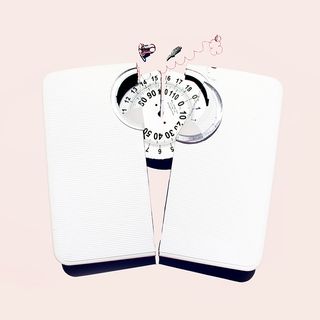5 Women on Whether or Not They Weigh Themselves


Questions like "How often should I weigh myself?" and "normal weight for women" have thousands of searches a month. Of course, the politics of answering them is complicated at best—and triggering, haunting, and anxiety-inducing at worst. It's a difficult choice, whether or not to keep a scale in your house, one that's deeply personal when you've had issues with weight. For me, it's not healthy. Weighing myself encourages a way of life I've since left behind, a more secretive, hateful, obsessive reality I've worked really hard to move past.
"I am not a fan of weighing yourself," says Amy Rosoff Davis, Selena Gomez's longtime trainer. "I think it breeds obsessive thoughts and behaviors. If you work out and eat healthy, your body should do the rest. When you have a healthy mind, body, and soul, the results will come. I prefer the jean test. You know how your pants fit, so go off of that instead of a number."
To gauge how other women feel, I reached out to a few friends and co-workers for their advice on the subject. Below, find their thoughtful words.
Erin
"Growing up, we never had a scale in the house, and it wasn't until my sophomore year in high school that I gave much thought to what my weight should or shouldn't be. After a bad back injury from dance, I was all of a sudden less physically active and in and out of doctors' office on what felt like a daily and weekly basis. So virtually overnight, I was getting weighed—a lot—during a time that I wasn't feeling great in the skin I was in. Whereas before I had at least been blissfully unaware of an actual number on a scale, I all of a sudden saw it (and loathed) that number at least two or three times a week. And in my mind, it seemed too high.
"There are a lot of things at play when it comes to developing an eating issue, but I think my overnight exposure and dread of the scale was one thing (of many) that contributed to a fast and furious snowball effect, which eventually led to a full-blown eating disorder. During the summer after my sophomore year, I vehemently decided to 'lose some weight,' and just a few months later, I found my self in in-patient treatment for anorexia—where, once again, I was weighed every. single. day. And though I was never told the number, I was constantly aware of how 'well' I was or wasn't doing, which, of course, was completely dictated by a number. (Oh, and all too often I did, indeed, discover what the number was.) So, once again, although with good intention, a number was dictating how worthy I felt. Prior to my eating disorder, I felt like a failure due to a number on the scale that seemed too high in my eyes, and then during treatment, I felt like a failure if the number was too low in my medical team's eyes. (While, of course, feeling completely uncomfortable with the number my doctors wanted to see.) So to call my relationship with the scale complicated would be a pretty huge understatement.
"Thankfully, I've been able to recover from my eating disorder almost entirely (but then again, it's not a skin you ever can shed completely), and after a scale dictating the ideas of 'success,' 'progress,' and even 'consequences' (like a hard-to-swallow increase in treatment), I have made it a point to stay far, far away from a scale. Everyone is different, but for me, it instigates an inaccurate, monopolizing, and all-around negative energy I simply don't need in my life. Sure, I get weighed at the doctor every so often or will step onto a scale at the gym, but those moments are few and far between. Weighing myself has only ever resulted in negative clouds of judgment, and it often brings me back to the super-dark days of my eating disorder—a place I have worked diligently to leave behind."
Anne Louise
"I have never had a scale in my house. If I did, I know I'd weigh myself four times a day and scold myself for any minute change. Or I could be feeling great. I could be admiring my butt in the mirror, my healthy curves, my strong thighs, and become curious if the number on the scale would match my satisfaction. When I see a number I don't like, though, reason fades. My list of things I wish would change are now the only things I will be thinking about all week.
"I can't control my thoughts, but I can turn my full-length mirror around to stop myself from sitting in front of it and holding onto my lower stomach at 4 am. I can remember that I get one body, no tradsies or givebacks, so it's time to start loving it because 28 years of hating it is already too long."
Victoria
"I stopped weighing myself several years ago out of sheer necessity; it was easily one of the most dangerous habits I associated with my eating disorder. Even though I'm at a much healthier place with my body now, I still find the scale to be an utterly useless and psychologically toxic tool. Weight fluctuates so much on any given day, and I typically weigh more when I'm in really good shape, even if I'm technically smaller. The number seriously just doesn't mean anything, so it's not worth the aggravation. I now go by how my clothes are fitting, and it's a much better strategy."
Hallie
"Weighing yourself can drive you crazy. Our intake of food and drink makes it so that our bodies fluctuate throughout the day. If you weigh yourself in the morning, it may read something different than at night. So why do it? It's difficult to gauge what that number really means, anyway. Muscle weighs more than fat, after all. It'll make you feel bad if the number is higher than you expected it to be—and feeling bad is a waste of your time.
"The last time I allowed myself to indulge—in this case, that means I kept a scale in my bathroom—I'd weigh myself compulsively every day. I don't mean I'd use it once in the morning and forget about it. Instead, I'd punish myself by stepping on that scale at least three times a day and feel shamefully guilty each time. Sure, if the number was lower than I expected, I'd engage in a tiny and short-lived celebration—one that ultimately meant nothing as part of the larger picture (the way I look at my body, the difficult task of getting dressed when I don't feel I look my best, etc.).
"The thing is, I'm recovering from an eating disorder. I say 'recovering,' in the present tense, because I don't ever feel like issues with weight won't be, in some way, a part of my reality. Now, I practice acceptance and know how to parse through those thoughts and feel okay anyway. I am better off than I've ever been, but still, I have triggers and setbacks like anyone else. I'd rather feel joy when I feel good than stay up nights worried about what the scale says. I'd rather eat Chinese food without fear of consequence. In my case, ignorance is bliss."
Melissa
"I choose to no longer weigh myself, because nothing good ever came from it. I was obsessed with my weight all throughout my teenage years, and the scale in my bathroom only intensified this. It wasn't until recently that I realized how much power this object had over my life. I have always been on the smaller side, but magazines and television made me feel as though I was never thin enough. My friends and family would constantly tell me to not worry about weight and how I was so lucky to be thin, yet for some reason, I couldn't believe them, because the number on my scale was telling me otherwise. I began to realize how warped my body image had become a few years into college and knew something had to change. I got rid of the scale in my bathroom and have never looked back. I feel so free and at peace with my body now, knowing that this number no longer needs to define my health."
Next up: What is the "right" advice for moms with daughters struggling with body image?
Disclaimer
This article is provided for informational purposes only and is not intended to be used in the place of advice of your physician or other medical professionals. You should always consult with your doctor or healthcare provider first with any health-related questions.

